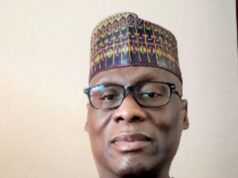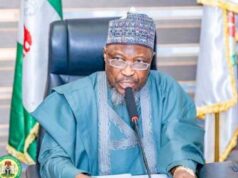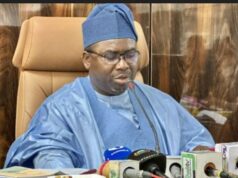
I wish to appreciate the privilege to present this paper in such a distinguished gathering, this is so for several reasons but let me cite just two outstanding ones. Firstly, this gathering is select, it is usually composed of the more senior and experienced members of the media which by extension means this is potentially a productive exercise in terms of policy deliverables. Secondly, this august audience, is of professionals with unusual insights and first-hand knowledge of usually confidential, behind-the-scenes development and therefore, of a group that is capable of nuancing our theories and pedestrian analyses with proper contexts. It is, therefore, an opportunity to lay before such a section of the fourth realm, what I consider to be the challenges before us as a nation in view of the general elections of 2019 and the role the media can play.
The State of the Nation
The Nigerian state is presently in the throes of a major crisis; the several fissures that have historically characterised the Nigerian State are again being reified by what has been couched in religious, ethno-subnational, institutional and leadership terms. The Fulani herdsmen conflict with indigenous hosts and the spate of killings, rapes and ruins trailing it has fanned the embers of hitherto latent ethno-religious tensions to a frightful proportion; the widely perceived inertia (at best) or bias by the political leadership in managing the crisis have made sectional tunes commonplace, the views expressed on social media are also in the main very disturbing.
Strident protests against the federal system, which has been termed as perverse and lopsided and the fiscal structure have led to demands for restructuring which although is amorphous, conveys an unmistakable message of dissatisfaction. The character of federal appointments especially to the security apparatuses are another source of what has been cited as evidence of a sectional ‘Fulani agenda’. These bode ill for us as a nation. Someone has posed the question of whether we can survive the next decade as a nation.
Just over a year to the next general elections, the crest of goodwill the incumbent administration rode to power is all but frittered, the widespread perception that government is not sufficiently effective in social provisioning, poverty alleviation, job creation, youth empowerment, security matters and even its swansong of corruption extirpation makes for a very despondent citizenry.
The perception of the political elite as self-serving, collusive and ideologically bankrupt increases what we in political economy term the voracity effect- a combination of multiple interest groups, weak institutions and multiple loci of power. Thus the challenge of managing the peace to negotiate 2018 and have peaceful elections as a nation in 2019 are both urgent and onerous and not just for the media.
The Role of the Media in Nation and Peace Building
The media without gainsaying and risk of over emphasis is critical to national cohesion, state building and a veritable peace-making instrument, especially in fledgling democracies such as Nigeria’s. My personal opinion, with a very strong sense of responsibility is that the media and judiciary have been the champions of our democratic praxis in the past two decades; unfortunately, the latter has been tainted very badly since the last administration. But the quality and role of the Nigerian media has played in the political evolution of the Nigerian State is legendary and globally acknowledged, however, the media will be sorely tested once again in the coming days given the state of the nation.
Let me adumbrate the roles of the responsible media in nation building:
v The Fourth Estate should constitute a forum for public discussion and debate. In new democracies, the expectation is that the media would help build a civic culture and a tradition of discussion and debate which was not possible during the period of authoritarian rule.
v The media should be a credible watchdog, the custodian of the public interest, and serve as a bridge between the political elite and the masses. The media should ideally bridge what political scientists refer to as the elite-mass lacunae.
v Ideally, the media should keep citizens engaged in the business of governance by informing, educating and mobilising the public.
v I belief the media is the prime agency for setting the agenda for public discourse
v The media hypothetically should be a reliable barometer of governance and governance perception.
v I also belief the media should be an assertive voice in ensuring justice, equity and constitutional probity.
The Nigerian media was referred to by Diamond as ‘…one of the freest’ in Africa (Diamond 1998:) and by Lewis as vibrant and pluralistic. However, there are peculiar challenges to the Nigerian media in the discharge of these roles.
Challenges for the integrative media
The first challenge of the Nigerian media I wish to allude to is the lopsided ownership structure which unfortunately seems to mirror the centrifugal subnational cleavages of the state. The ‘South’ in Nigerian political parlance owns more than its proportionate share of the media- print and electronic, the former Midwest especially seem to dominate media ownership and whereas, this is should not be a major factor in the functioning of an integrative media, the divisive ethnic prism for appraising the Nigerian state is often applied to the media to distort reportage. Arguably however, it is State-owned media, whether national or state, print or electronic that have gained notoriety for being little more than mouthpieces of their entrepreneurs. This must be transcended somehow for the media to achieve its full potential as an instrument of nation building.
A related hurdle is monopolistic ownership of media houses, the efficacy of the media in shaping opinions was well borne in the US presidential elections, the Kenyan, Rwandan, Zambian and Liberian elections as well as the Brexit votes in 2016. The strategy of Cambridge Analytica, which though a PR firm, of engaging the media to sway electoral outcomes in US, Brexit and Kenya is also instructive that with the media, the payer can dictate to the piper.
Another major challenge is that media houses, irrespective of ownership structure can and have been used as proxies in the battle between competing political groups. Whereas, nothing is constitutionally underhand for media entrepreneurs to be card carrying members of political groups; it imposes a greater doubt on neutrality, integrity and accuracy. (AIT for instance).
Proxy media houses by promoting even inadvertently promoting the sectional interests of their sponsors often trigger divisive rather than consensual news, hate speech instead of sober debate, and suspicion rather than social trust. In these cases, the media contribute to public cynicism and democratic decay (Coronell).
A further traditional challenge of the media through all ages in all climes are stringent laws and the threat of violent repression. Hopefully, in the dark days are gone forever for the media in Nigeria. Although full vent must be given the freedom of information act in all its ramifications.
Due to the insatiable appetite for salacious, shallow and sensational news, not just by Nigerians but globally, a competitive and pluralistic media market like Nigeria may prove too tempting for ethical, fact-based and censored reportage; where the overriding imperative for a media outlet is profit-at-all-cost, the allure of filthy gain may subordinate stringent vetting processes.
The Nigerian Media and Peace Building for 2019
Amartya Sen argues that ‘transparent guarantees’ are required for a civilised and progressive society; these have a clear instrumental role in preventing corruption, financial irresponsibility and underhanded dealings one of these guarantees is a free and fair press[1]. This underscores the importance of the Press/media in the challenges ahead.
The media should embrace what is now been referred to aspeace journalism; this I belief was popularised by Angela Castellanos[2]. Peace journalism has been defined as follows:
endeavours to promote reconciliation through careful reportage that gives voice to all sides of a conflict and resists explanations for violence in terms of innate enmities or ancient hatreds. Peace journalism avoids giving undue attention to violence, focusing instead on the impact of war on communities on both sides of the divide and their efforts to bridge their differences (Cornel op cit:17).
The Kenyan experience illustrates it brilliantly. After been widely vilified for its role in the catastrophic aftermath of the 2007 presidential elections, in 2013, the Kenyan media unanimously adopted peace journalism framework; they shunned all controversial and provocative issues and downplayed the ethnic identities and other divisive fissures in their reportage. Although the Kenyan press was criticised for this,, its sensible defence was that erring on the side of caution was better and safer than abetting bloodshed.
The Nigerian media can adopt what I would term a sensitive mode by exercising sound discretion in the manner and language of covering and reporting combustible issues.
The media can provide warring groups mechanisms for mediation, representation and voice so they can settle their differences peacefully.
Unfortunately, the media have sometimes fanned the flames of discord by taking sides, reinforcing prejudices, muddling the facts and peddling half-truths. (ibid:5).
Conclusion:
The Nigerian media has a major role to play in sustaining what as been referred to as the Nigerian project, the consolidation of our democratic culture and delivery of good governance. To achieve these, the media will have to find a way to rise above the several diversities that characterise us as a people and become a veritable tool for establishing truth and a fair reflection of vertical and horizontal relationships, it has to become a governance barometer as well as a voice for the perceptions and aspirations of the masses.
Investigative journalism has to be emphasised, which prioritises fact-based reportage over the sensational. A major challenge for the Nigerian media going to 2019 is counteracting the social media, which is cheaper and faster and far less ethical.
Although social scientists believe no research is entirely objective, the media must rise beyond narrow mindedness and become the unbiased arbiter it is most suited to be.
Finally, the media should be fearless and serve the historical role of being the last bastion of resistance against authoritarianism, injustice and tyranny, it should refrain from hero-worship and self-serving purposes.
I thank you for this opportunity and wish you a very fruitful deliberation, trusting we will together take Nigeria beyond the 2019 Rubicon.
Thank you!
Dr. Aderemi, senior lecturer at the Lagos State University (LASU), delivered this paper at the State House Press Corps Workshop January 20, 2018, Abeokuta Ogun State, Nigeria.[myad]






